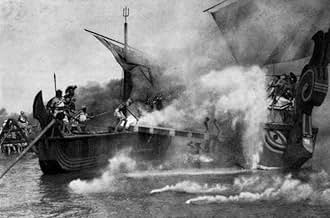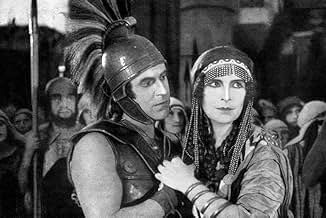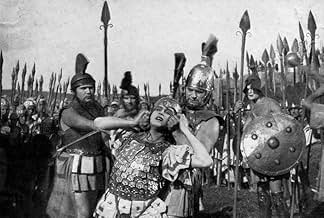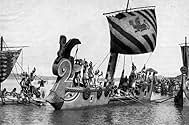Paris vole la belle Hélène à son mari. Les amoureux se réfugient à Troie, et la guerre éclate.Paris vole la belle Hélène à son mari. Les amoureux se réfugient à Troie, et la guerre éclate.Paris vole la belle Hélène à son mari. Les amoureux se réfugient à Troie, et la guerre éclate.
Friedrich Ulmer
- Menelaos
- (as Fritz Ulmer)
Karel Lamac
- Patroklos
- (as Carl Lamac)
Rudolf Meinhard-Jünger
- Tersites
- (as Rudolph Meinhard)
Histoire
Le saviez-vous
- AnecdotesFor many years the film was considered partially lost until it was reconstructed from a version found in Swiss archives.
- ConnexionsEdited into Spisok korabley (2008)
Commentaire à la une
One of the most ambitious epics to be made during the silent movie era but one of the most ignored was January 1924's "Helena," directed by Manfred Noa. The reason for this two-part, three-plus hour extravaganza being neglected in the annals of movie history was partly because its production expenditures almost bankrupted one of Germany's largest film studios, Munich's Bavaria Film. The other is after its worldwide distribution and subsequent showings into the 1930s, all the prints of this mammoth motion picture disappeared.
A print emerged in 1999 in a movie archive house in Lausanne, Switzerland, casting a light on Noa's 'masterpiece.' Split into two parts, 'The Rape of Helen' and 'The Fall of Troy,' "Helena" was partly based on Homer's 'The Iliad' as well as other Greek sources. The production consisted literally a cast of thousands. Up to its release, "Helena's" chariot race was the best at capturing the excitement of the sporting spectacle. The Grecian battles and Trojan Army attacking transport ships docking in Troy was realistic in detail. And when the Trojan Horse was hauled inside the gates of Troy, its enormous size showed the structure was more than big enough to secretly ensconce a load of Grecian soldiers to temporarily take over the city and open the gates to the outside battalions waiting to storm in.
Noa was entrusted in handling such a large budget on the basis of his widely successful 1922 'Nathan the Wise,' which preached religious tolerance in the face of bigotry, especially in the face of increasingly anti-Semitism in Germany after the Great War. Despite its success, 'Nathan the Wise' was greeted by protests in Munich for being too pro-Jewish.
Noa, a film set designer before he was given a chance to direct his first movie in 1916, eventually directed over 40 movies into the early talkie stages. He died of peritonitis in December 1930 at the young age of 37. Once they took over Germany, the Nazis made it a point to erase Noa from the film history books because of his Jewish descent. Fortunately his masterpiece has been restored for future generations to appreciate his handling of an epic few directors are capable of creating.
A print emerged in 1999 in a movie archive house in Lausanne, Switzerland, casting a light on Noa's 'masterpiece.' Split into two parts, 'The Rape of Helen' and 'The Fall of Troy,' "Helena" was partly based on Homer's 'The Iliad' as well as other Greek sources. The production consisted literally a cast of thousands. Up to its release, "Helena's" chariot race was the best at capturing the excitement of the sporting spectacle. The Grecian battles and Trojan Army attacking transport ships docking in Troy was realistic in detail. And when the Trojan Horse was hauled inside the gates of Troy, its enormous size showed the structure was more than big enough to secretly ensconce a load of Grecian soldiers to temporarily take over the city and open the gates to the outside battalions waiting to storm in.
Noa was entrusted in handling such a large budget on the basis of his widely successful 1922 'Nathan the Wise,' which preached religious tolerance in the face of bigotry, especially in the face of increasingly anti-Semitism in Germany after the Great War. Despite its success, 'Nathan the Wise' was greeted by protests in Munich for being too pro-Jewish.
Noa, a film set designer before he was given a chance to direct his first movie in 1916, eventually directed over 40 movies into the early talkie stages. He died of peritonitis in December 1930 at the young age of 37. Once they took over Germany, the Nazis made it a point to erase Noa from the film history books because of his Jewish descent. Fortunately his masterpiece has been restored for future generations to appreciate his handling of an epic few directors are capable of creating.
- springfieldrental
- 25 déc. 2021
- Permalien
Meilleurs choix
Connectez-vous pour évaluer et suivre la liste de favoris afin de recevoir des recommandations personnalisées
Détails
- Durée3 heures 24 minutes
- Couleur
- Mixage
- Rapport de forme
- 1.33 : 1
Contribuer à cette page
Suggérer une modification ou ajouter du contenu manquant

Lacune principale
By what name was Hélène de Troie (1924) officially released in Canada in English?
Répondre































